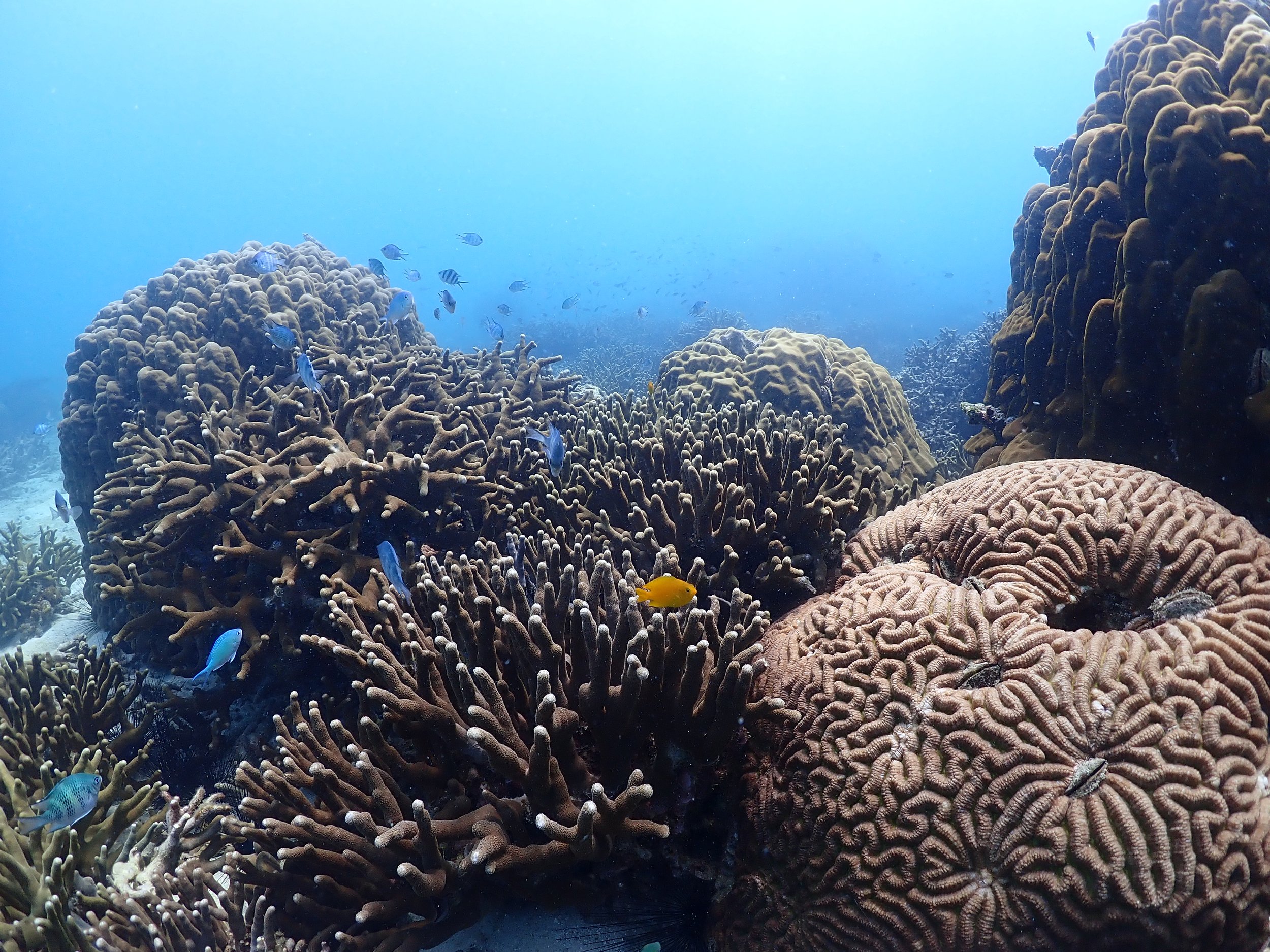Reflections on a year that passed so fast…
…that it barely seems like yesterday that I returned from a trip to the UK in the middle of January…with a broken leg, still!
This has been quite a momentous year for RCM. We have achieved so much it is difficult to summarise it easily. But here goes!!
Meaningful local community participation (CMCG)
This year has been hugely important for Reef Check Malaysia – or perhaps I should say, communities. Our model for community participation in conservation, the Community Marine Conservation Groups (CMCGs), has proven to be a very important vehicle to empower local communities to participate in managing the resources on which they all rely – be it as a food source, or for livelihoods in tourism.
Two CMCGs in one picture - TMCG and RMCG
From a modest beginning in Tioman (in 2015), we now work with communities in eight locations, providing training in conservation activities such as ghost net removal, coral predator control, monitoring and so much more.
CMCGs are making a real contribution to the health of the marine environment. Mobilising community support is critical in raising awareness among local communities of the need to manage marine resources, and their participation greatly strengthens our work. We hope to be able to expand the network of CMCGs next year.
Are our reefs in decline?
Of growing concern however, the results of our 2024 survey programme highlight the continuing decline in coral reefs around Malaysia.
And this year it has not just been local threats that reefs have had to deal with. The coral bleaching event this year – recognised as the fourth global bleaching event – has had a significant impact on reef health, with up to 80% of corals bleached at the height of the event, and an estimated 30% coral mortality in some areas.
Our reefs faced the 4th mass coral bleaching phenomenon this year
Urgent action is required now to reduce local threats (such as sewage pollution, land clearing and tourism impacts) if reefs are to have any chance of surviving in the long term. It’s that serious.
Reefs provide us with food; they are important in tourism; and they inspire us with their diversity and beauty. We need them.
Funding for biodiversity conservation
I was privileged to attend COP 16, the biodiversity conference, in Cali, Columbia, in October. It was interesting – and concerning – to hear a constant message: we are facing a biodiversity crisis.
Species and habitat decline continues, despite the best efforts of many, and it was widely recognised at the conference that action is required right now.
Unfortunately…no-one seems to know the best approach. Lots of presentations about what can be done…but we seem to lack the political commitment to take the actions required.
And the necessary funding is not forthcoming. In particular there is huge interest in the emerging field of biodiversity stewardship – not credits, like carbon, but some sort of certification that can unlock funding for biodiversity conservation. It’s something we are following closely, and we will be putting more resources into this next year.
Malaysia’s funding for biodiversity conservation
One thing worth highlighting here: Malaysia is blessed that the Federal government is able to provide significant funding for biodiversity conservation.
This year the Ecological Fiscal Transfer (EFT) scheme allocated RM 150 million to States for improving resource management. Ok, it’s not perfect – but it’s better than most countries are able to do.
Speaking to people from many countries at COP 16, I didn’t find any other country that is spending so much. Kudos to YB Nik Nazmi and his team at NRES for managing this effort, and we stand ready to work with them to strengthen the scheme.
We were also able to present YB Nik Nazmi with a copy of our Reef Rehabilitation Toolkit
looking forward: Strengthening Community participation
Looking forward to 2025, we will be starting two new long-term programmes to further strengthen the role of local stakeholders in marine resource management. Funding from Oceans 5 and Paul M Angell Family Foundation will allow us to build capacity in management at State and island levels, and we hope to work with agencies at State and Federal level to create a role for local stakeholders in management.
These programmes will also allow us to look into more sustainable, long-term funding opportunities, broadening our funding base.
Our vision for the future? Healthy reefs make for healthy communities, and we want to see better management supported by local stakeholders. That’s what we will be focusing on for 2025.
Best wishes for the festive season, and let’s hope that 2025 marks a turning point in how we manage these important ecosystems. We all rely on them, we all have a stake, we should all be involved.
Our Gratitude for Your Support
Finally, I would like to take this opportunity to thank our many supporters, without whom none of this would have been possible.
Our long-term programmes in Tioman (Yayasan Sime Darby), Mersing (MISC Group), Redang (Yayasan Hasanah, NCTF) and Sabah (IKI, KePKAS, Coca-Cola Foundation) are not only important in their own right, but also provide a platform that enables us to do so much more with local communities, often supported by smaller sponsorships from local companies. And let’s not forget the private individuals who collectively provide around 10% of our funding.
And last but not least all those volunteers who participate in surveys, giving back to an environment they all cherish. A huge thanks to all of you for your on-going support.
Oh, and the leg is fixed now!!
______________________________________________________________________________________
If you'd like to support us, you can follow our social media pages for any updates on our work and volunteering opportunities, or you could also donate towards our cause.




